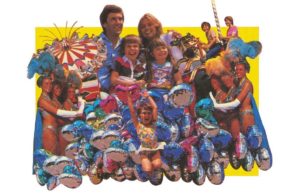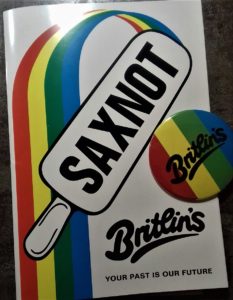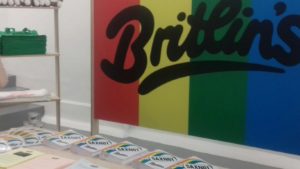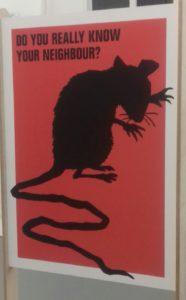 On Thursday evening I entered Scott King’s world of Saxnot at Studio Voltaire, Clapham.
On Thursday evening I entered Scott King’s world of Saxnot at Studio Voltaire, Clapham.
What is Welcome to Saxnot?
Physically, it is an installation consisting of a series of free–standing infographic works, written material, including a Welcome to Saxnot brochure, information leaflets/propaganda, as well as questionnaires and other promotional material. Plus products, T-shirts, soft toys, bags and badges – my Britlin’s badge sits beside my laptop as I write. There will be Britlin’s representatives to guide visitors through the installation, promoting the benefits of Britlin’s and urging visitors to sign–up to a new life in Saxnot (though not last Thursday). N.B. The products are not for sale.
Conceptually, it is an exploration of the human need for belonging and ownership of our emotional and intellectual place in the world; and how those needs can be subverted by the unscrupulous.
Saxnot is an Anglo-saxon god, not one of those who inhabit the modern popular imagination, but some may recognise him, he is also known as Seaxnat. In this installation Saxnot is the first of a series of four new towns or camps being set up by the Britlin’s, the other three being Frigg, Balder and Loki. The idea of Britlin’s owes much to Butlin’s and the eponymous holiday camps of the 1950s – 1970s, with their ethos of community, jolly fun and regimented togetherness. Some of the infographics include reminiscences from people who went to and enjoyed such real holiday camps around the coast of the UK. The Welcome to Saxnot brochure includes maps, menu cards and adult activity plans which reflect this. It also includes extracts from The Future of Nostalgia (Basic Books, 2001) by Svetlana Boym, someone, whom I hadn’t come across before, with interesting ideas about nostalgia and its dual nature.
 King’s is a vision of how nostalgia can be manipulated for political or ideological advantage, but he is affectionate towards, not belittling of, the memories belonging to that generation which grew up immediately after WWII. His town is built around an idealised memory of Britain’s past, when everyone knew their neighbours, went on holiday to holiday camps, were served in shops by shop assistants, not machines and felt at home and comfortable. It is this fantasy which is being aggressively re-marketed by Britlin’s as Saxnot and projected into a new future for Britain.
King’s is a vision of how nostalgia can be manipulated for political or ideological advantage, but he is affectionate towards, not belittling of, the memories belonging to that generation which grew up immediately after WWII. His town is built around an idealised memory of Britain’s past, when everyone knew their neighbours, went on holiday to holiday camps, were served in shops by shop assistants, not machines and felt at home and comfortable. It is this fantasy which is being aggressively re-marketed by Britlin’s as Saxnot and projected into a new future for Britain.
Welcome to Saxnot emerges out of the ongoing debates about Brexit and who we are. It is a lot more nuanced than the often binary discussions encountered in public life (especially on social media). As King said, there are a lot of folk out there who voted for Brexit who come from the  Britain of those memories and fantasies. Believing in the values which those memories stimulate doesn’t make people stupid, or uninformed (he was not enamoured of the ‘Guardian-reading liberals’ who patronise such folk). A holiday at Butlin’s may have been fun of a very particular kind, not appealing to many today, but it would not have been divorced from reality. Nostalgia, necessarily, is. It is also much, much harder to counter.
Britain of those memories and fantasies. Believing in the values which those memories stimulate doesn’t make people stupid, or uninformed (he was not enamoured of the ‘Guardian-reading liberals’ who patronise such folk). A holiday at Butlin’s may have been fun of a very particular kind, not appealing to many today, but it would not have been divorced from reality. Nostalgia, necessarily, is. It is also much, much harder to counter.
The dark side of Saxnot is evident – the requirement to conform, the identification of belonging in terms of excluding those who don’t – the ‘other’ ( see The Demagogue’s Handbook ). In physical terms this is manifest in the poster ‘Do you really know your neighbour?‘ clearly referencing the imagery beloved of Dr Goebbels, but also in some of the questionnaires which applicants for Saxnot should complete.
By the way, do read the teen-mag type cartoon ‘Nightmare’ – it is very funny, especially the wandering accents. The ‘Report by Professor Matthew Worley’ too is essential reading – it acknowledges a debt to both Peter Mandelson and Roger Liddle.
This is King’s first solo institutional London show, it runs to 11th February and is a timely and thought-provoking addition to current debates about identity and politics. It is also FREE to enter. So go, it is well worth a visit.
If you enjoyed reading this article you might also enjoy Rainbow Aphorisms Vittorio Scarpati & Cookie Mueller Anselm Kiefer Carol Robertson – Stars at Flowers
Incidentally, whilst at the opening I was chatting briefly to Jeremy Deller (I had been unable to go to his ‘F**k Brexit’ party the night before – asterisks mine) about ‘We’re ‘ere because we’re ‘ere‘ presented on the anniversary of the Battle of the Somme – see Battle Art.


 RSS – Posts
RSS – Posts